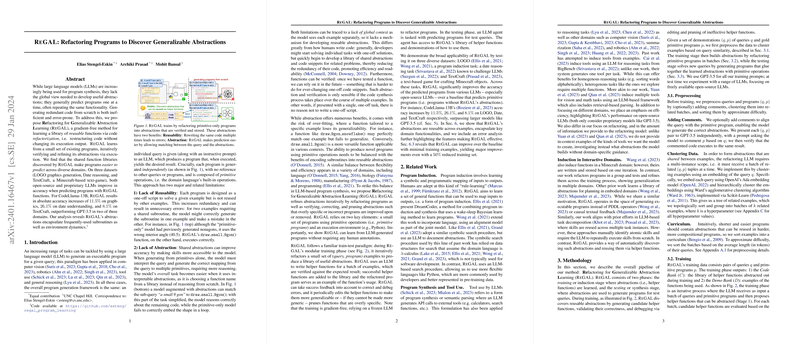Methodology
The advent of LLMs in program synthesis has enabled a host of complex tasks to be automated through code generation. However, a critical limitation is the LLMs' inability to leverage a global understanding that would enable them to create reusable code abstractions. Essentially, LLMs tend to produce redundant and non-reusable code for each task independently, which is not only less efficient but also error-prone. The Refactoring for Generalizable Abstraction Learning (ReGAL) approach is designed to overcome this limitation by refactoring programs into a library of reusable functions verified through execution.
ReGAL works by learning from a set of existing programs, refining them iteratively. This is accomplished without the use of gradients, instead relying on the execution feedback to verify and refine its suggestions. Crucially, the abstractions learned through ReGAL yield significant improvements in code prediction accuracy across various LLMs and datasets.
Empirical Results
When deployed, ReGAL showed an impressive impact on the efficiency and accuracy of code synthesis. Specifically, using the CodeLlama-13B model, it achieved accuracy increases of 11.5% on LOGO graphics, 26.1% on date understanding, and 8.1% on TextCraft. It is noteworthy that these improvements outpaced larger models such as GPT-3.5 in two of the three tested domains. The results underscore ReGAL's potential to generalize across various functions and applications.
Comparative Analysis
Looking at ReGAL relative to existing methods, it presents a unique approach by relying exclusively on an LLM for both refactoring and program prediction, in contrast to earlier works where symbolic search was more common. ReGAL's gradient-free training paradigm allows it to use more common languages like Python and learn from LLMs-generated programs without requiring human annotations, which contrasts with other systems that depend on extensive human inputs.
Conclusion
In conclusion, ReGAL positions itself as a notable advancement in the domain of LLMs and program synthesis. It demonstrates a clear capability to refactor existing code into reusable and generalizable abstractions, thereby streamlining the program prediction process and significantly enhancing accuracy. The tool's applicability to varied datasets reinforces its adaptability and reaffirms the value of developing shared code libraries for task execution. Going forward, ReGAL might well redefine the standards of efficiency and reliability in automated program synthesis.
